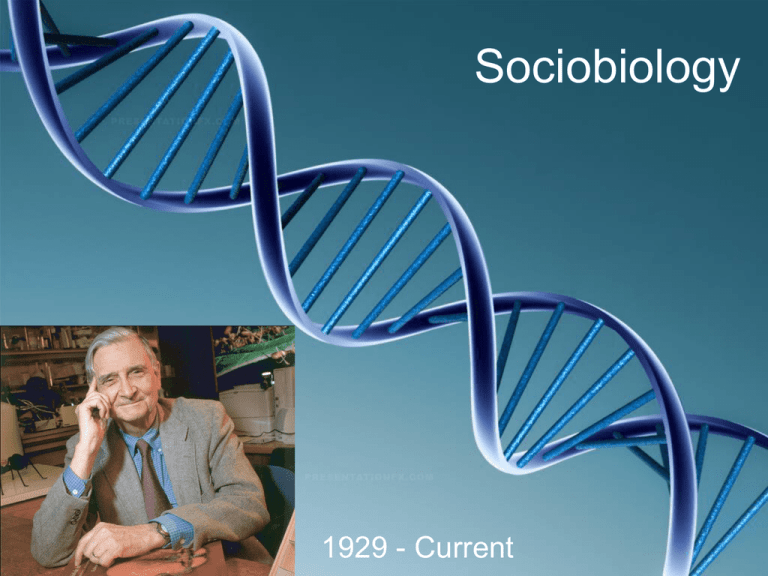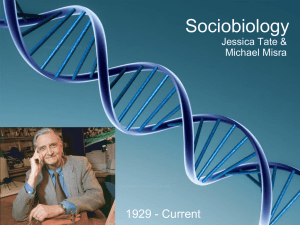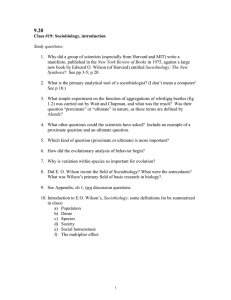Sociobiology 1929 - Current
advertisement

Sociobiology 1929 - Current Edward Wilson- Sociobiology and Evolutionary Theory • Most influential social thinker in the field of sociobiology – – – – Harvard professor for four decades Has won two Pulitzer prizes Father of biodiversity Primarily a biologist and most of his work has been involved with the examination of the social structure of ants – He founded the field of sociobiology, a science that connects biology to human social behavior – Wilson’s contention that social behaviors have genetic components has changed the study of human behavior and generated plenty of controversy – In 1996, twenty-five Most Influential Americans according to Time magazine and has been identified as one of the 100 most influential scientists of all time Influences • Ernst Mayr and his book Systematics and the Origin of Species – It was Wilson’s “bible.” – Mayr strengthened Wilson’s attraction to the study of biology and evolutionary sciences. – When Wilson was attacked by media and other colleagues for his sociobiological ideas, Mayr was one of the few people who publicly defended him and his studies. New Direction • Wilson argued – role of learning was grossly overestimated by B.F. Skinner (behaviorist) – we must now press on in a new direction • Sociobiologists – “The human race is a product of evolution and that vast quantities of information are passed on by our genes. It follows that genes as well as environment play a role in society and that behavior has a biological base” (Wallace and Wolf, 1999:383). • Sociobiologists are not just genetic determinists who believe that all human behaviors are rigidly controlled by genes. – Instead they argue that biological factors and genetic influences place limits on the range of possible behaviors (Wallace and Wolf, 1999). Biological Reductionsim • “The tendency to explain social phenomena in terms of biological causes such as physiology or genes” (Kornblum, 1991:102). – Specific genes cause specific behaviors • Ex. A specific gene causes criminal behaviors • Ex. A specific genes causes someone to drink alcohol Key concepts to understanding Wilson’s Biological Theories • • • • • • Society- group of individuals belonging to the same species and organized cooperatively. (reciprocal, cooperative communication) Aggregation- a group of individuals of the same species, comprising more than just a mated pair or a family, gathered in the same place but not internally organized or engaged in cooperative behavior. Colony-society of organisms which are highly integrated Individual- any physically distinct organism Group- a set of organisms belonging to the same species that remain together for any period of time while interacting with one another to a much greater degree than with organisms of other species Population- a set of organisms belonging to the same species that occupy a clearly delimited area at the same time. – • • • • A species is a population or a set of populations within with the individuals are capable of freely interbreeding under natural conditions. Communication- action on the part of one organism or cell that alters adaptively the probability pattern of behavior in another organism or cell Coordination- interaction among units of a group so that the overall efforts of the group is divided among the units without leadership being assumed by any one of them Hierarchy- the dominance of one member of a group over another Regulation-the maintenance of one or more physical or biological variables at a constant level. Social Insects • Ants, termites, and the highly organized bees and wasps – These insects can be distinguished as a group by their common possession of three traits 1 Individuals of the same species cooperate in caring for the young 2 There is a reproductive division of labor 3 Overlap of at least two generations in life stages capable of contributing to colony labor (offspring assist parents) Selfish Genes • Not consciously selfish. – Race goes on to those who behave in ways that promote interests of their genes. • Thus the genes that are still in the race will reproduce and for the other genes they are no longer in the race and will not reproduce. Kin Selection • Kin selection is an evolutionary theory that proposes that people are more likely to help those who are blood relatives because it will increase the odds of transferring genes to future generations. Altruism • Members of families generally watch out for one another and assist in raising and nurturing the next generation – Primary behaviors of altruism Thwarting of predators Cooperative breeding Food sharing (most altruistic) Sociobiology & the Human Species • Biologists refer to such a lack of competition from other species as ecological release • Humans inherit a tendency to attain behavioral and social structure. This inclination is shared by the human population and can therefore be called human nature. • Humans have free will and free choice, but the channels of psychological development are imbedded very deep in human genes. • Understanding of the evolution of social behavior depends on a full understanding of the population information, including population growth rate, and the genetic structure of the population Controversy with Sociobiology • When applied to human societies, sociobiology has drawn severe criticism from both social scientists and biologists (Kornblum, 1991:102) • “Several critics said that Sociobiology would have been a great book if it had not added the final chapter, the one on human beings.” – • Marxists attacked sociobiology – • • Social scientists wished he had never entered “their” domain Just as the nature of ants creates colonies of queens, drones, workers, and slaves, the nature of humans creates racism, sexism, patriotism, wars, religion, and class exploitation. Wilson used this "revelation" to argue that efforts to fight against racism, sexism, and imperialism go against human nature and are thus exceedingly difficult, and to claim that communism is unscientific and cannot work Wilson believed social scientists misunderstood the context of sociobiology UPDATED definition of sociobiology “the systematic study of the biological basis of all forms of social behavior, including sexual and parental behavior, in all kinds of organisms including humans” Sociologists • • View sociobiology as an attempt “to legitimate aspects • of human societies that people wish to reform and to set limits on how far you can change or perfect people. Sociologists argue that human beings are essentially a creature of cultural norms, and biological universals extend no further than basic activities such as eating, excreting, and sleeping – Cultures are too diverse and biology cannot explain much • Sociologists recognize that genes determine certain characteristics such as skin and eye color but do NOT determine human behavior. Sociobiologists Wilson did recognize that social sciences are far more complex than the hard science, but that social scientists attempt to oversimplify their theories by basing them on common sense, and ignoring the findings of psychology and biology. – Argued that social scientists have paid little attention to the foundations of human nature Biophilia and Biodiversity • Biophilia- innately emotional affiliation of human beings to other living organisms – Little evidence in support of biophilia • Biodiversity- undisputed reality Wilson’s Three Truths • 1.) humanity is ultimately the product of biological evolution • 2.) diversity of life is the cradle and greatest natural heritage of the human species • 3.) philosophy and religion make little sense without taking into account these first two concepts Consilience • Overwhelming criticism of Wilson is directed at his reductionist attitude when explaining human behavior • Consilience means “jumping together” of knowledge by linking the facts and fact-based theory across disciplines to create a common groundwork of explanation – This means that social scientists are to abandon their approach to the study of human behavior and embrace the idea used by natural scientists: that specific genes cause certain behaviors. – Wilson believed that if sociology allows for the impact of genes on behavior, a more valid scientific theory can be created. Evolutionary Theory • Sociobiology falls within the framework of evolutionary theoretical thought • Spencer made connections with biology and sociology with the term “survival of the fittest.” – However focus was on culture not a genetic emphasis • Durkheim rejected biological explanations of social behavior Contemporary Sociobiology • Everyday behaviors related to religion and morality are all said to stem from our genes. • Pierre van den Berghe- argues that the very reasons humans are “social” is that we find sociability advantageous in reproducing and guaranteeing the survival of our species – Organisms help one another increase the likelihood of the survival of their species • Richard Machalek- all species are obviously quite distinctive, but that all species confront the same basic problems of organizational structure and regulation needed to guarantee survival • Gerhard Lenski- argued that human society is influenced by biological evolution, where genetic information is transmitted through he reproduction of new organisms • J. Richard Udry- gender differences have biological roots: women are better suited to certain behaviors than are males, and vice versa. – He is committed to integrating biological variables in the social sciences Relevancy • The question is whether human behavior is a result of genetics (nature), or the social environment and the social learning process (nurture), or some combination of both? – Sociologists = nurture – Sociobioloists = nature Examples of controversy of Sociobiologists vs Sociologists • Is alcoholism a disease? – Sociobiologists- If it is a disease, then a gene is responsible for someone being labeled an alcoholic • Number of people in US still insist that alcoholism is a disease caused by a unidentified gene – Not enough evidence to prove – Sociologists- it is the social environment that individuals learn to drink, and how drinking is reinforced will dictate whether the drinking behavior continues or not. • Wilson believes that racism, sexism, ageism, are caused by genes and not learned by social environment – In response, Sociologists believe that values, languages, attitudes, and culture are all learned phenomena Importance & Contributions • Importance on human society and about future humanity • Wilson argued that humans should respect the environment and the diverse species within it • He believes that the next great period of extinction is pending, and this time it will be due to not some environmental catastrophe, but to the actions of human beings Limitations • Wilson’s version of sociobiology is fatally flawed in its most basic methods • Comparison and inference patterns between highly diverse animal species. Contemporary Examples • Barnes et al. Contemporary Examples • “Throughout the past 30 or 40 years most criminologists couldn’t say the word ‘genetics’ without spitting,” Terrie E. Moffit, a behavioral scientist at Duke University, said. “Today the most compelling modern theories of crime and violence weave social and biological themes together.” • Researchers estimate that at least 100 studies have shown that genes play a role in crimes. Contemporary Examples • Everyone in the field agrees there is no “crime gene.” What most researchers are looking for are inherited traits that are linked to aggression and antisocial behaviors, which may in turn lead to violent crime. Don’t expect anyone to discover how someone’s DNA might identify the next Bernard L. Madoff. • And that is precisely the problem, said Troy Duster, a professor of sociology and bioethics at New York University, who argues that studies examine not the remorseless and rapacious behavior of the rich and powerful, but the behavior of disadvantaged minorities. “ Contemporary Examples • Everyone in the field agrees there is no “crime gene.” What most researchers are looking for are inherited traits that are linked to aggression and antisocial behaviors, which may in turn lead to violent crime. Don’t expect anyone to discover how someone’s DNA might identify the next Bernard L. Madoff. • And that is precisely the problem, said Troy Duster, a professor of sociology and bioethics at New York University, who argues that studies examine not the remorseless and rapacious behavior of the rich and powerful, but the behavior of disadvantaged minorities. “ Contemporary Examples • But a predisposition is not destiny. “Knowing something is inherited does not IN ANY WAY tell us anything about whether changing the environment will improve it,” Ms. Moffitt wrote in an e-mail. “For example, self-control is a lot like height, it varies widely in the human population, and it is highly heritable, but if an effective intervention such as better nutrition is applied to the whole population, then everyone gets taller than the last generation.” QUESTIONS?


